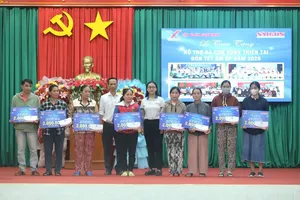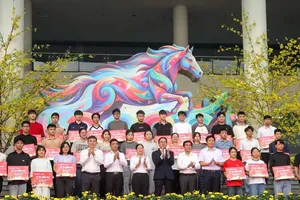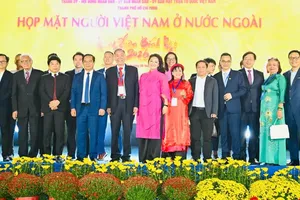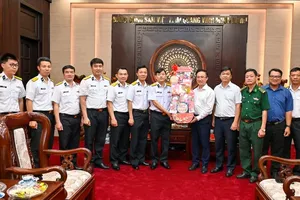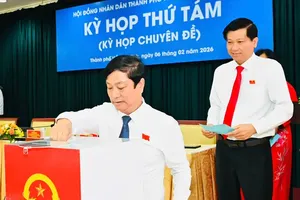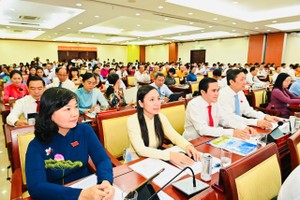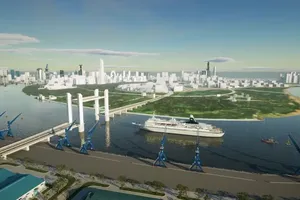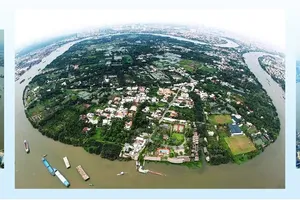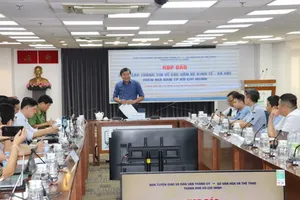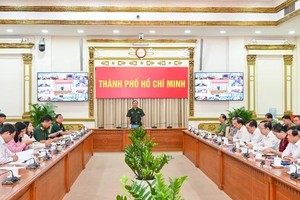With a streamlined administrative structure and more concentrated resources resulting from the merger of Ho Chi Minh City, Binh Duong, and Ba Ria–Vung Tau provinces, government agencies and administrative units will have the conditions to improve operational efficiency, promote the application of information technology, and enhance the quality of public services.
Ensuring continuity of services for citizens and businesses
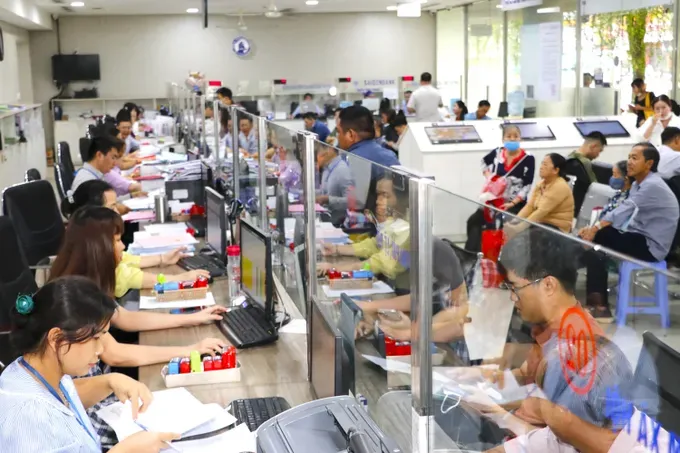
In the final days of May, wards and communes across Ho Chi Minh City have just focused on handling administrative records and procedures for people and preparing for the restructuring of administrative units and building a new two-tier administrative system.
At the People’s Committee of Vinh Loc A Commune in Binh Chanh District, numerous boxes filled with documents and files were carefully packed. Civil servants and administrative staff worked with urgency and professionalism, ensuring that all requests were handled efficiently and without disruption.
According to Chairman of the Vinh Loc A Commune People’s Committee, Phung Quoc Viet, the commune’s officials and civil servants have been firmly guided by the principle that serving the public and supporting businesses is the top priority. Throughout the ongoing administrative reorganization, cadres and public employees have handled administrative procedures for people and digitized documents in accordance with regulations, ensuring continuity and minimizing disruptions for residents and businesses.
Nevertheless, following the restructuring, those living in areas with underdeveloped infrastructure may face difficulties in accessing public services. To address this, the local authorities will continue to create the most favorable conditions to ensure that all citizens can complete administrative procedures easily.
Following the administrative reorganization, the new Ho Chi Minh City will consist of 168 administrative units, including 113 wards, 54 communes, and one special economic zone, and its population will grow from 9.9 million to over 13.7 million. This event marks the beginning of a journey to build Ho Chi Minh City into a megacity, a powerful growth engine for the Southeast region, the Southern Key Economic Zone, and the nation in a new phase.
Dr. Bui Ngoc Hien of the Ho Chi Minh City Cadre Academy noted that as the newly restructured city begins operating under a two-tier local government model, challenges in delivering public services are likely to arise. Therefore, in addition to adhering to legal regulations and guidance from central agencies, the new Ho Chi Minh City administration must synchronously concretize and implement solutions to ensure that public services for citizens and businesses remain uninterrupted.
In particular, the governments of the newly established 168 communes, wards, and special administrative zones must proactively begin exercising their responsibilities and authority. The city government should place strong emphasis on effectively implementing its responsibilities and on coordinating with and guiding local governments to ensure synchronized, effective, and efficient public administration and service delivery across all levels. In the long term, the digital transformation of public services should be strengthened alongside a rational and effective delegation of powers and responsibilities. Ultimately, all public service activities must be oriented toward serving the people.
Ensuring the effective operation of the system
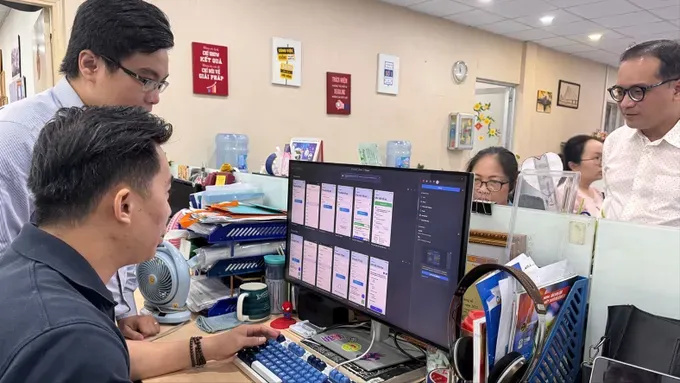
To ensure the quality of service for citizens and businesses, the Ho Chi Minh City People’s Committee has issued directives to departments, agencies, and local authorities regarding the operation of information systems in wards and communes following the administrative reorganization.
Under these directives, city authorities requested the implementation of tasks to ensure the operation of essential systems and IT infrastructure across public offices.
The Department of Science and Technology has been assigned to carry out the system for receiving information and coordinating the processing of requests from city units and collaborate with the Government Cipher Committee to implement procedures for the provision of digital signature services.
Mr. Nguyen Tran Phu Thinh, Deputy Director of the Ho Chi Minh City Digital Transformation Center, said that the center is currently focusing on integrating and unifying the deployment of software for receiving and handling administrative procedures, document management, online TV systems, and citizen feedback processing. In parallel, the center is actively collaborating with the National Data Center to connect these platforms with national databases on population, taxation, social insurance, and business registration. This integration aims to streamline administrative processes, reduce processing times, and significantly improve the overall experience for citizens and businesses.
The Digital Transformation Center is collaborating with various departments to carry out electronic process configuration and integrate them into the shared system, grant identification codes, prepare accounts for the 168 wards, communes, and special zones, and allocate user permissions to ensure readiness for system operation.
Upon completion of the administrative reorganization, the new Ho Chi Minh City will be operated and managed within a fully digital environment. Currently, the Department of Science and Technology is working closely with the Digital Transformation Center and relevant departments to develop an implementation plan for an integrated information system spanning from the provincial to the communal levels.
The Department of Science and Technology and the Digital Transformation Center are also proactively coordinating with specialized agencies of Binh Duong and Ba Ria–Vung Tau provinces to review and prepare technical plans, infrastructure, and solutions necessary to support the merger process and the establishment of the new Ho Chi Minh City.
Notably, the Ho Chi Minh City Digital Transformation Center has conducted training sessions on the use of shared software systems related to administrative reorganization. These trainings were provided to officials, civil servants, and public employees across the departments and localities of Ho Chi Minh City, Binh Duong, and Ba Ria–Vung Tau.
Mr. Lam Dinh Thang, Director of the Ho Chi Minh City Department of Science and Technology, stated that the Departments of Science and Technology of Binh Duong, Ba Ria–Vung Tau, and Ho Chi Minh City, in collaboration with the Ho Chi Minh City Digital Transformation Center, have proactively coordinated to ensure the smooth operation of information systems across the three localities. This coordination guarantees that the work of civil servants in all three areas proceeds without disruption.
Furthermore, the initiative ensures that citizens, businesses, and other stakeholders can access and utilize the information systems and databases through a unified, synchronized, and user-friendly interface while maintaining information security and data privacy.
Agencies have also conducted surveys on the current status of local document management systems and interconnected models to propose solutions and plans for implementing a single unified document management system. This aims to ensure continuity and convenience in the processing and storage of documents.
The Ho Chi Minh City People’s Committee has assigned the Ho Chi Minh City Digital Transformation Center to ensure equipment availability and the allocation of personnel to manage the process of providing services for the renewal and modification of information on digital signature certificates used in public service.
The Ho Chi Minh City Digital Transformation Center must urgently complete dossiers and procedures and implement the shared document management system for administrative agencies and units.
Departments and agencies are proactively advising the Chairman of the Ho Chi Minh City People’s Committee to promptly announce the list of provincial- and commune-level administrative procedures upon publication by relevant ministries and sectors.
The list of administrative procedures will be forwarded to the Digital Transformation Center for configuration and sent to Ho Chi Minh City’s administrative procedure management information system.
The Department of Finance is responsible for coordinating with various departments and localities to provide advice to the City People’s Committee on location arrangements for administrative units of the commune-level People’s Committees following the reorganization.
The Department of Home Affairs has instructed wards and communes to assign one to two dedicated IT officers to lead the implementation of digital governance at the local level following the administrative reorganization and mergers.

